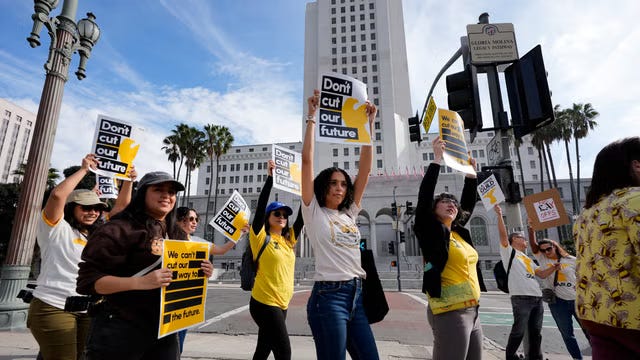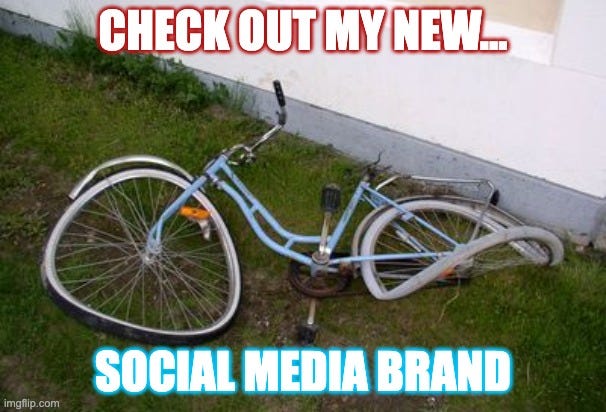The LA Times massacre - there is no 'reset'
Another week, another seeming disaster as journalism jobs get rinsed into oblivion. But the problem is way more complex than people outwith media will ever know
Pop quiz, asshole - why would anyone want to buy a stake in a media organisation these days?
Let’s take Billionnaire-a-million-times-over Jeff Bezos as our primary example. The Amazon founder bought the Washington Post for $250m, 10 years ago. It seemed like a weird exchange at the time, and he generally let it be. 2013 was a simpler time.
But eventually, Jeff decided that it could be of benefit to him. After he stripped the site of editors and, in the process, interrogation of content, the Post lost $100m and will almost certainly lose the same, if not more, in 2024.
But forget Bezos. This week, the LA Times sent 33% of their editorial staff down the green mile, citing difficult market conditions. There’s another Bezos-like billionnaire that owns that historic publication, and as well as putting his 28-year-old, ill-equipped, SJW daughter in charge of operations, he is in fact burning another US media institution to the ground.
In the UK we have our biggest city’s daily newspaper wholly owned by a foreign entity in the form of Evgeny Lebedev, who, along with London’s Evening Standard, ironic as it must seem, oversees the Independent.
Imagine Richard Branson owning a newspaper in Moscow, Beijing or even Washington and you’ll come some way to understanding how ludicrous this is. And the Daily Telegraph is currently up for sale, with some dubious interests circling the bidding process.
You don’t have to be a genius to work this out. Buying up legacy media brands and controlling them outright is the ultimate way to control the message of what you are attempting to achieve. You are indirectly buying the competition - ie, journalists who might have something to say about you, and what you are doing.
It’s so ludicrously easy, it really should have happened before (at least, on this scale before. It worked well in a few other places in the past.)
I work in media, get to the point!
Ok, sorry.
I hear that attention spans aren’t what they used to be, which brings me to this tweet that at once suggests a great idea, but is the entire heart of the problem within which media currently exists.
Why doesn’t independent media - ie not legacy brands, ones that can’t be bought and are beyond the mainstream - fill in the gap?
Lee’s comment is not the problem, and his is shared in many platforms. It’s more the execution of it. If you are independent media, what exactly does that mean?
So what’s the difference?
Quite a few years ago, all the major content distribution platforms made an executive decision on content.
It went like this:
Facebook: Holy shit, we’re so big that we’re deciding elections? Zuck can’t face another round in front of the US senate. I dunno, tell them we’re all about friends and family.
Instagram: Facebook, we’re cooler than you guys but we just do what Meta tells us.
Google: Our algorithm for top news publishers became totally AI in 2019 (it really did, by the way. It’s the most underreported news item in the western world, but it’s true). If you’re new and you’re good enough, you’ll get in!
Note: (You absolutely won’t).
YouTube: We’d prefer at least eight minutes of analysis on that point now. Or 20 seconds. Or anything in between. We don’t know, really.
Tiktok: Post stuff here and we’ll pair it next to a natural disaster, while a girl eats pasta. Oh, and we’ll pay you nothing for doing it, either.
Snapchat: Sorry, we missed that. What?
Twitter: WE LOVE ELON
You get the idea.
The point is that media publishing is intrinsically tied to the various methods of distribution that simultaneously need it, yet despise its very existence.
Facebook in a huge way, and Twitter to a lesser extent, grew their audiences on the back of link clicks to content. It created places of congregation and it was a mutually beneficial relationship.
The megalomaniacal owners of both of those hell-sites turned their back on content long ago, but there’s still a flow of juice, a tiny one, dripping from them for legacy publishers to justify remaining on there.
You’re not getting to the point!
Sorry, I’m getting there.
The point in effect is this; these legacy brands, the ones that Bezos and the Russians and the Arabs wish to acquire, are being bought for unfeasible money because it’s virtually IMPOSSIBLE for an independent news site to EVER build that scale of audience any more.
Believe me, I’ve tried. I’m still trying. Social media growth beyond hugely particular niche content has stagnated to the point of death. Even Tiktok’s growth has fallen off a cliff as they include more ads. The content utopia of social is dead and yet, like a cyclist incessantly attempting to ride a broken bike, publishers keep getting on, yet complain about why it’s not going anywhere.
So the idea of independent news media unshackling itself from the mainstream brands - those being relentlessly overthrown by dirty money - it’s just not that easy.
There’s equity cash that has been thrown all over the place trying to achieve exactly this. Tortoise have been attempting it for a long time in the UK, to massive costs and not enough revenue.
Buzzfeed hired an entire UK/US division to do this, one that was burned to the ground just last year.
And the Athletic - don’t make me tap the ‘never been profitable’ sign, but it’s now mind-bogglingly obvious that they’ll never get there, and it’s down to a New York Times decision on what to do with it.
So it’s not a case of ‘it’s never been tried’.
It has been, in two ways:
New brands utterly stifled by flat growth in social, and Google’s reticence to rate news websites on actual merit, rather than legacy
Ambitious subscription models that will never be met because Gen Z don’t want to pay for content (this will be a future edition).
So are we fucked?
To a certain degree, we are. There’s legacy relationships in place with all of the main distributors - search, social, referral - that are part of the bartering price when you buy them.
This isn’t an editorial content decision - it’s an outreach decision. And you, as the new owner of Newzzzzz.com - well, you don’t have any of those.
You could have the best investigative journalism team in the universe and under modern distribution rules you will never make a dent.
That’s why buying loss-making newspapers make sense - if you want to kill them. And it’s why your new website will never, ever compete in the internet as we currently know it.
So yeah, let’s set up our alt-mainstream brands.
Hope you’ve plenty of cash in the bank and a message to send - because reporting the news is unlikely to be the answer.






